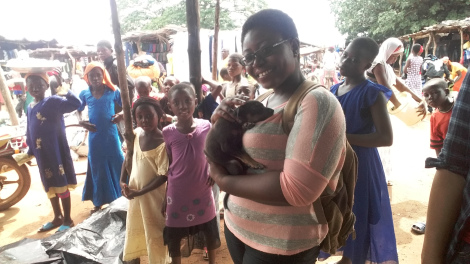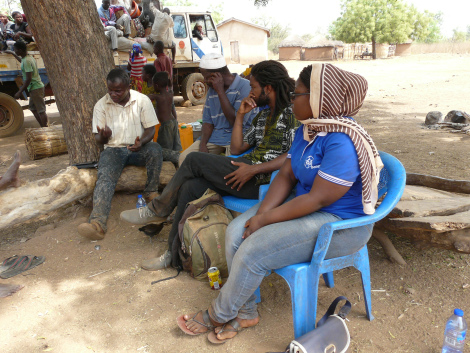Life as a Ghanaian foreigner in Ghana
By AdministratorI came to the Northern Region of Ghana with a group of Americans to volunteer for the Humanist Action: Ghana. Our program is unique in so many ways and I particularly love how diverse we all are in culture and ethnicity. Although I am the only Ghanaian in the group, my colleagues are all from different parts of the USA and from different backgrounds.
When we first started our journey to the Northern Region, I worried about how difficult it would be for my colleagues to fit into the new environment and make the transition from their familiar American lives straight to a rural one in West Africa. Aside from our coordinator, none of the American volunteers had been to Africa before. I, being the excessive worrier that I am, was concerned about what kind of impression they would have of my country if things did not go well in Bimbilla, the town we would be living in. What I did not foresee was that even with my dark skin and thick Ghanaian accent I too would be considered a foreigner in the Northern Region.
There are more than 250 spoken languages and dialects in Ghana. In Bimbilla, the locals speak Dagbanli. The Dagbanli word for white person is silimiinga. Most natives will call any white person or anyone they deem a foreigner silimiinga. It didn’t take long for me to realize I fall into the second category: although I am Ghanaian, I am considered a foreigner in Bimbilla.
 At first, it annoyed me to be called silimiinga, so I started making a mental list of all the reasons Northerners consider me a foreigner. I dress very differently from the locals. (Jeans and tee shirts are very comfy.) I grew up in Accra in a less restrictive family and environment. I speak noticeably better English than most of the locals. I live and work with my American colleagues and although I wouldn’t call myself a globetrotter, I have been to a few places outside Ghana and have picked up a few foreign traits along the way. Even when I speak Twi (another Ghanaian local language, but one that is more widely spoken than Dagbanli) with locals it still isn’t enough to convince some of them of my real ethnicity.
At first, it annoyed me to be called silimiinga, so I started making a mental list of all the reasons Northerners consider me a foreigner. I dress very differently from the locals. (Jeans and tee shirts are very comfy.) I grew up in Accra in a less restrictive family and environment. I speak noticeably better English than most of the locals. I live and work with my American colleagues and although I wouldn’t call myself a globetrotter, I have been to a few places outside Ghana and have picked up a few foreign traits along the way. Even when I speak Twi (another Ghanaian local language, but one that is more widely spoken than Dagbanli) with locals it still isn’t enough to convince some of them of my real ethnicity.
I used to wonder, am I really that different? Is my lifestyle really so un-Ghanaian it needs constant clarification? However, I now realize that being a siliminga in the Northern Region does have its perks. The men here treat me with the kind of respect very few Northern women are accorded. My ideas and contributions are valued in meetings. In a part of Ghana where women are certainly not considered equal to men, people listen when I speak. My job, which largely involves interacting with the local community, is made a lot easier.
The kids in Bimbilla are not used to having foreigners around. Especially foreigners who rent a house and plan to stay for a long time. We, all of us, are surrounded by excited children anytime we venture out of the house. People yell ‘silimiinga’ at me sometimes and some insist I am American no matter what I say.
I used to wonder, am I really that different? Is my lifestyle really so un-Ghanaian it needs constant clarification? However, I now realize that being a siliminga in the Northern Region does have its perks. The men here treat me with the kind of respect very few Northern women are accorded. My ideas and contributions are valued in meetings. In a part of Ghana where women are certainly not considered equal to men, people listen when I speak. My job, which largely involves interacting with the local community, is made a lot easier.
 The kids in Bimbilla are not used to having foreigners around. Especially foreigners who rent a house and plan to stay for a long time. We, all of us, are surrounded by excited children anytime we venture out of the house. People yell ‘silimiinga’ at me sometimes and some insist I am American no matter what I say.
The kids in Bimbilla are not used to having foreigners around. Especially foreigners who rent a house and plan to stay for a long time. We, all of us, are surrounded by excited children anytime we venture out of the house. People yell ‘silimiinga’ at me sometimes and some insist I am American no matter what I say.
The way I see it, being silimiinga in Bimbilla is not the problem. The problem is that sometimes I need to be silimiinga to be recognized and respected. The problem is that sometimes even Ghanaians don’t think being Ghanaian is enough.
In other parts of Ghana, things are slowly changing. The modern day Ghanaian youth have begun to place more value on our self-worth and recognize that every Ghanaian man, woman, and child deserves the same kind of respect and appreciation we show our foreign brothers and sisters. How much longer can our government and religious leaders tell us feminism is just a western influence when we young women all over Ghana have begun setting our own rules and standards for Ghanaian feminism? Many Ghanaian women are setting new strides in their respective fields as entrepreneurs, scientists, teachers, farmers, and lawmakers. Even in our homes, men and women are beginning to challenge gender norms and set better examples of equality and shared responsibility for their children. I see a new era coming where I won’t have to be a Ghanaian silimiinga to be respected and valued.
